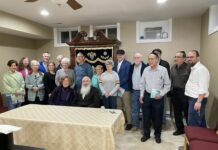Pearlstone has been giving Israeli families a chance to relax and refresh themselves after the events of Oct. 7 with a recent retreat weekend tailored around their circumstances.

During the weekend of Nov. 10-12, Israeli families living in the Baltimore area spent time at the retreat center, connecting with others like them and enjoying Pearlstone’s expansive outdoor campus.
Pearlstone is the headquarters of Adamah, a national environmental organization, and an agency of The Associated: Jewish Federation of Baltimore.
Compared to Pearlstone’s regular retreats, held multiple times per year, the healing retreat for Israeli families came together in a very short amount of time. It was scheduled a little over a month after the initial attacks, and planning took place over two-and-a-half weeks, but tickets for the retreat sold out within four days of sales opening.
“We realized how much local Israeli families needed an opportunity to gather and have a chance to begin the healing process, even as they are continuing to experience fear and trauma,” said Ashley Pressman, Pearlstone’s Chesapeake region program director.
Pressman was responsible for much of the retreat’s organization and managed to recruit representatives from the Shinshinim Hub at Jewish Educational Services, the Foundation for Jewish Camp and The Associated as partners.
“As we were seeing events unfold in Israel and this horrific massacre, we feel helpless to some extent in North America. We were looking for things we could do to help. What we’re good at at Pearlstone is retreating, offering opportunities for people to come together as a community and feel,” she added.
In order to accommodate the needs of Israeli families, much of the retreat was held in both Hebrew and English. Retreat attendees went hiking on Pearlstone’s campus, engaged in discussion of Kabbalah and discussed the process of healing from trauma. The retreat also offered activities for children, such as meeting and interacting with Pearlstone’s farm animals, taking a storybook walk with PJ Library and taking a ride on the on-campus zip line.
“This weekend was definitely the highlight of my visit to the States at this time. The combination of nurturing, stillness, majestic nature, camaraderie, good food, spirituality, music and the amazing abundance of Hebrew hit the spot,” said Rachelle Tehila Martin, a recent transplant who has been staying with relatives in Baltimore since leaving Israel after Oct. 7.
Many Israeli families have left the country, with some staying with relatives or friends in the U.S. in hopes of waiting out the conflict or preserving their own safety. For many, this has been a very difficult adjustment to make as they have to search for new living arrangements and jobs, all while keeping up with news of what has been happening in Israel and Gaza.
If only for a weekend, the Pearlstone retreat offered sanctuary to these Israelis, allowing them to forget about their troubles for a moment or discuss better ways to deal with them constructively with others in their situation.
Pressman estimates that around 25 families attended last month’s retreat, a total of 120 people. Many of these families were multigenerational, with guests including grandparents and cousins.
“We’ve always believed in the power of Jewish retreating, but this gathering was on a different level of holiness. There is a deep yearning to be together right now and we will continue to meet this need,” Adamah CEO Jakir Manela said.
Adamah plans to hold similar retreats targeted at Israeli citizens in the U.S. in the future. The organizations is currently working on another one to be held at its other retreat center, the Isabella Freedman Jewish Retreat Center, in Canaan, Connecticut. Adamah is also discussing the possibility of creating a retreat for Israeli and Jewish-American college students due to the rising antisemitic incidents on college campuses.
“The families were so grateful for the opportunity to be together. I heard over and over that people had been feeling isolated, that they couldn’t talk to their colleagues about what was going on and that they were having an experience no one else was sharing,” Pressman said of the initial retreat. “Gathering with people who had a common experience and a common trauma was very important.”







